- Home
- Bruce, Leo
Case for Sergeant Beef Page 7
Case for Sergeant Beef Read online
Page 7
‘Tell you what,’ she said at last. ‘I sent a pair to the Jumble Sale a few months ago. Pretty well done for, they were. I wondered who could possibly want them.’
‘They were sold?’
‘I suppose so. You’d better see Eva Packham about that. She had the old clothes stall. She’s the curate’s sister.’
‘I will,’ said Beef, and made one of his laborious notes.
‘Do you think that someone wore them – to incriminate me?’ asked Miss Shoulter.
‘We shall see,’ said Beef severely. ‘Now about this brother of yours.’
Her breezy manner dropped for a moment. I was watching her closely, and I could understand what Chatto had meant when he said that he believed she was quite fond of the wretched man.
‘He was what you call a bad hat,’ she said. ‘No doubt of that. Mother and Father spoilt him as a child. And I’ve never been able to do much with him. He was two years older than me and very self-willed. He got through the money they left him in about five years, then started looking round for more. It never seemed to occur to him to work for it. I used to beg him to get a job. But he never did. I’m afraid he lived on women quite a bit when he was younger. He had studied chemistry and once tried to run a chemist’s shop. Then he scrounged a living out of racing. He’s never actually been to jail. But he was the type you read about in novels by Mrs Henry Wood. Drink and the devil, you know. Of course, I was his sister, and that makes a difference.’
It was queer to see this noisy, hearty woman as she spoke of her brother. I was convinced that she was quite sincere.
‘I tried, often enough. But for the last few years I’ve – well, I’ve tried to protect myself a bit. I told him I had no money left. I’d find him a pound or two when he came down. But then he’d go to the local pubs and make a fool of himself. Quarrel, you know.’
‘Who with?’ asked Beef. I’ve given up trying to correct his grammar.
Miss Shoulter paused.
‘No one in particular,’ she said. ‘He just got quarrelsome. Anyone who argued with him.’
‘You never heard of any particular quarrel?’
‘No.’
‘So he had no enemies down here?’
‘Not that I know of.’
‘Who did he know in Barnford?’
‘Just the men he met at the Crown or the Feathers. And the Flipps, of course.’
‘Why “of course”?’
‘He’d known Flipp in London. There was some sort of business between them. I never knew that. It was through Ron that the Flipps came to live here at the beginning of the war. He told them about “Woodlands” being vacant. And whenever he was down here he went up to see Flipp.’
‘They were friendly?’
‘Yes. So far as I know. It’s rather odd now I come to think of it, but I don’t think I ever saw them together.’
‘Who was aware that your brother was coming down for Christmas?’
‘Pretty well everyone. He’d been down only three weeks before. He told several people then that he was going to spend his Christmas with me. And I probably told others.’
‘I see. When he came down how did he usually come from the station?’
‘He’d leave his bag for the bus to bring and walk up. Take the footpath through the wood.’
‘He always did that?’
‘Yes. It saves over a mile.’
‘So that almost anyone living round here would know that some time or other after the arrival of the London train he would be walking along that footpath?’
‘Yes, but they wouldn’t have much idea of when. My brother usually stopped in the village for a drink and might easily not come here till they slung him out at ten o’clock.’
‘Ah! Now about the gun.’
‘Can’t be much use over that, I’m afraid. Haven’t’ the remotest when it went. I’m pretty careless about things, and there’s nothing in this bungalow worth pinching except the dogs. I never noticed it had gone till a week before Christmas.’
‘Do you think your brother might have taken it when he was last here?’
‘Possible. But I shouldn’t think so.’
‘Who knew what cartridges you used?’
‘Warlock’s, I suppose. And I tell you who else knew that,’ she said, smiling. ‘Little Mr Chickle. He’s a dear little man who’s just come to live at “Labour’s End”. He was asking me about a fortnight ago where he could get some cartridges and I told him that his only hope was Warlock’s and that they supplied “Fesantsure” to all of us.’
‘Do you know him well?’ asked Beef with a monstrous affection of casualness.
‘Little Chickle? He’s in and out of the house all day.’
‘He does a bit of shooting, too?’
‘Well, he does. But I don’t honestly think he likes it. I think he sees himself as a country gentleman walking about with a gun. Poor little chap kept a watchmaker’s shop for thirty years and has just retired. Pathetic, really. He told me the first time I saw him that he didn’t shoot. He couldn’t bear to cause suffering to a living creature. Then later he started this potting at rabbits.’
‘I see. Now about these shots.’
‘I can tell you exactly what I heard. I’ve gone over it so many times with the police that I should know by now. I heard two shots in quick succession somewhere between three and half-past, and two more just like them about an hour later. That’s all.”
‘Where were you round about six?’
‘Here. Why?’
‘Didn’t hear anything then?’
‘No. I had the wireless on softly though.’
‘You went to Copling in the afternoon?’
‘Just to post a letter.’
‘Who to?’
‘My bank in Ashley.’
‘Ask them if they’ve kept the envelope. Might have in these days of paper-saving. The envelope would be handy,’
‘I will.’
Then I think that’s all.’
‘There’s one thing I ought to tell you.’
‘Yes?’
‘It’s about Flipp. Very odd. When I was on my way to Copling a little before four o’clock I went to call on Flipp. I wanted to borrow something. And he wasn’t in his house. I shouldn’t have thought anything about it only he told the inspector that he’d never been out. I know he wasn’t there. I went right in and called him and looked in the rooms. It was all open to the world – we leave our houses like that round here. And he wasn’t in.’
‘That’s interesting,’ said Beef. ‘That is interesting. Now I’d just like a word with your kennel-boy.’
‘Certainly, You’ll find him down at the kennels. And for goodness’ sake find out who did do it,’ said Miss Shoulter as she showed us out. ‘I hate all this suspicion about the place.’
‘I will,’ promised Beef. ‘It may take time, but I will.’
‘Good man!’ shouted Miss Shoulter heartily.
S.B.—3
CHAPTER ELEVEN
Mrs Pluck Could Shoot
JACK RIBBON, smartly attired in riding breeches and a yellow roll-top pullover, was waiting for us.
‘Thought you’d want to see me,’ he said.
‘Oh, you did? And how did you know anything about us?’ asked Beef.
‘I heard you were about. Working for the old girl, aren’t you?’
‘That’s not the way to talk of your employer,’ admonished Beef. ‘And who told you I was investigating on her behalf?’
‘She said she’d engaged you. But it’s all over the place you was on the job. Staying at the Crown, I hear.’
I could not help being amused at this when I remembered how indiscreetly Beef had spoken to Tom, Dick, and Harry about our business. I gave him a meaning look which he pretended to ignore.
‘You hear a great deal too much,’ remarked Beef. ‘Perhaps all you know about this murder’s hearsay, too?’
‘Murder, is it?’ said Jack Ribbon, sticking his hands in the high pockets of his breeches. ‘Well,
I’m not surprised. Nobody liked him and that’s a fact.’
‘Which means you didn’t?’
‘No, I didn’t. But nor didn’t nobody else. Scrounging blighter.’
‘Who else didn’t like him?’
‘No one didn’t.’
Ribbon refused to disentangle himself from this maze of negatives by enlarging on this, so Beef tried another question.
‘Who did he associate with down here?’
‘Anyone who’d buy him a drink.’
‘No one in particular?’
‘He always used to call on Flipp when he came down.’
‘Always?’
‘Never missed.’
‘What time of day would he call?’
‘Night-time, usually.’
‘How do you know, then?’
For the first time Jack Ribbon showed some hesitation.
‘Well?’
‘There’s a couple of young ladies work for Flipp.’
‘You mean the servants? For Gawd’s sake call a spade a spade, lad. There’s nothing to be ashamed of in being a servant. “Young ladies who work for Flipp.” Do you describe yourself as the young gentleman in charge of Miss Shoulter’s kennels?’
‘Well, servants, then. They told me.’
‘Thick with them, are you?’
‘I meet them at dances.’
‘What else did they tell you?’
‘Something I bet you’d like to know,’ said Jack Ribbon with a grin.
‘Come on, then,’ said Beef.
‘I’m keeping that to tell the real police.’
I thought Beef would lose his temper. But he showed some of his countryman’s cunning.
‘That’s all right, then,’ he said, turning over the page of his note-book as though he had finished with the matter. ‘I’ll tell Inspector Chatto you have some information for him, and I shall get it from him.’
Jack Ribbon’s pleasant face fell.
‘I was only thinking in terms of five bob,’ he said blandly.
Beef grinned.
‘Young monkey. Ought to be ashamed of yourself trying to make money out of something you know in a case like this. Still, I was glad of five bob when I was your age,’ And he handed him the money.
‘It’s not much really,’ admitted Jack Ribbon. ‘If you don’t think it’s worth the dollar you can have it back. It was about the girls going home for Christmas. Mrs Flipp’s away, see, and they didn’t want to go. Neither of them didn’t. They’ve not much of a home and their father’s a proper –’
‘Now then!’ warned Beef.
‘Well, he is. And they’d much rather of stayed at “Woodlands” over Christmas. Besides, they’re a decent pair of janes and didn’t want to see the old man with no one to look after him at Christmas time. But he insisted that they went. Quite nasty he got. And in the end he paid their bus fares, too. Told them not to come back before the 27th.’
‘Mm.’
‘Worth the money?’ asked Jack Ribbon.
‘You can keep your dollar,’ Beef said shortly. ‘Now what else do you know?’
‘I know a lot,’ Jack said.
‘Go ahead, then.’
Jack launched into a long discursive account of Ron Shoulter’s visits, his drunkenness, and how he ‘upset’ Miss Shoulter, including the astonishing occasion on which he had found her in tears. He went on to the gun which he had not seen since he cleaned it back in October, adding that he did not often go into the house and in any case probably would not have noticed if it had gone. He did not think that Shoulter would have taken it ‘unless he meant to sell it.’ He had never known Miss Shoulter to use the gun and had never fired it himself. He knew Joe Bridge who was ‘all right’, though an awkward chap to fall out with. He did not suspect anyone in particular of murdering Shoulter.
About his finding the body. He had been on his way to church.
‘Roman Catholic?’ asked Beef.
‘Yes. Midnight Mass at Copling.’
And he described with a slickness that suggested that he had told the story many times already his finding of the body. But Beef was not interested in the ‘horror’ aspect of this and wanted to know exactly how the corpse had lain. After several unsuccessful attempts at verbal explanation Jack Ribbon was induced to risk soiling his clean breeches and pullover by lying in the position in which Shoulter had been found, with a stick beside him for the gun. The dead man, it seemed, had been flat on his stomach with his face turned towards the fallen tree and his arms spread out.
He next told us of his midnight visit to Wellington Chickle, whom he described as a ‘decent old boy’.
‘You say the old man had gone to bed and the housekeeper was still up?’
‘Yes. She’d been to the pictures at Ashley.’
Then he went on with the story of his call on Constable Watts-Dunton and how the latter’s wife thought he was playing the fool.
‘Why?’ asked Beef severely.
‘Well, what would you think if someone was to wake you up on Christmas night and say there was a dead man in Deadman’s Wood?’ asked Jack Ribbon, grinning.
‘Depends whether whoever woke me up was known for larks or not. Larks on the police, I mean to say.’
Jack Ribbon was sobered by that, but enjoyed himself again in describing his walk with the solemn Watts-Dunton to the scene of the crime, and how the constable had remained on duty there while he, Ribbon, had gone for the doctor and to phone on Watts-Dunton’s behalf to the Ashley police.
‘Never got to Mass that night,’ he added, ‘and never got any sleep at all.’
‘Too bad,’ said Beef without any sign of sympathy. He had only a few more questions for Ribbon. The latter remembered Miss Shoulter going off on her bicycle in the direction of Copling at about four o’clock that afternoon, but did not see her return. She was back, however, when he ‘packed up’ at half past five. He recalled spontaneously that old Mr Chickle had seemed very put out when he had heard that the body had been found near the fallen tree, the spot where he had been known to hang about, and had also seemed a bit peeved by the news that the dead man was Miss Shoulter’s brother. But Jack remembered the brandy with appreciation. He also recalled the occasion on which he had overheard Flipp tell Miss Shoulter about Chickle frequenting the spot by the fallen tree.
One last rather back-handed little story he told about Mrs Pluck, which I appreciated more than Beef because it seemed to give me another suspect. One day when old Chickle had been away in London he had been passing ‘Labour’s End’ when Mrs Pluck had called him in for a cup of tea. He had been sitting in the kitchen with her when she remarked that she hated being left alone in the house. Surely she wasn’t afraid of burglars, he had said, because he had noticed that she was strong as a horse and had hands like a man. Well, she had explained, it was lonely there by the wood when the old gentleman was away. Still, she had gone on with more spirit, if anyone did try anything she’d know what to do. Mr Chickle’s gun was handy and she would not hesitate to use it. Jack had laughed and said he did not suppose she knew how to fire a gun, but she had told him not to be silly. She was a farmer’s daughter and had shot rabbits before he’d been thought of. Then she had smoked a cigarette with him, which action, he said, ‘looked funny’.
At last Beef seemed ready to go. I was frankly impatient, and when we had left young Ribbon I suggested that we should have to hurry to be in time for the inquest.
‘No need to start careering along like that,’ said Beef irritably. ‘What do you want to go to the inquest for?’
I was dumbfounded.
‘But of course we must go to the inquest,’ I told him. ‘There may be valuable information.’
‘Valuable my foot,’ said Beef in his grossest way. What you mean is you hope to fill a chapter with it.’
This was a particularly irritating remark, as I had hoped, as a matter of fact, that the inquest would be interesting enough to be included in my account of the whole affair.
&nbs
p; ‘I’ve noticed that when you fellows want to make your story go further you always put in the inquest. What for? Nothing ever comes out that you don’t know already. Yet you spin it out and describe all the witnesses and introduce the coroner, and all the time kid your readers they’re learning something more about the crime.’
‘Beef!’ I cried angrily. ‘Who’s writing this story, you or me?’
‘I’ve got an interest in it, haven’t I? I want you to make it readable. Let’s get on with the investigation and leave out all that nonsense in the village hall. There’s plenty that will interest your readers if you go about it the right way.’
‘I shall do nothing of the sort,’ I said. ‘Whether you attend the inquest or not, I shall certainly do so.’
‘All right. Keep your hair on. I’ll have a bite of lunch and perhaps forty winks this afternoon. Helps me to think. You go and hear what the experts have to say.’
I did. And it is annoying to confess that as usual Beef was right. The proceedings were long and tedious, but I learnt nothing from them which I had not known already. Chatto had given us the gist of the experts’ reports and hearing these in detail did not help. Miss Shoulter gave evidence of identification, Jack Ribbon was reproved when he tried to make our flesh creep with his account of his discovery and Wellington Chickle, Mrs Pluck, Miss Shoulter, and Mr Flipp were called on briefly to describe their hearing of the gunshots. The coroner made a verbose summing-up and the verdict, as Beef and Chatto had predicted, was ‘Murder against some Person or Persons Unknown’.
It was striking half-past four as I reached the Crown in a very bad temper, which was not improved when I went to Beef’s room and found him stretched on the bed, fully dressed except for his boots, and snoring lustily.
S.B.—3*
CHAPTER TWELVE
Mr Chickle Heard Shots
AFTER tea Beef suddenly decided to call on Wellington Chickle and set off at a swinging pace towards ‘Labour’s End’ while I told him about the inquest. It did not take us long to reach the house and we found ourselves on the doorstep under the scrutiny of Mrs Pluck.
‘I don’t know whether Mr Chickle will see you,’ she said. ‘He’s very upset by this nasty business. He’s not in just now, anyway.’

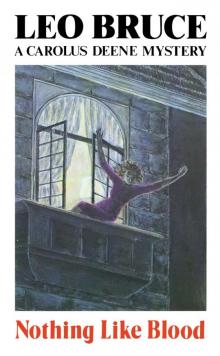 Nothing Like Blood
Nothing Like Blood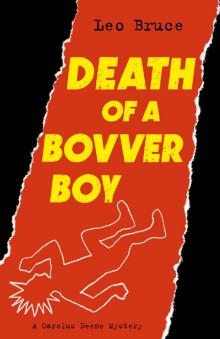 Death of a Bovver Boy
Death of a Bovver Boy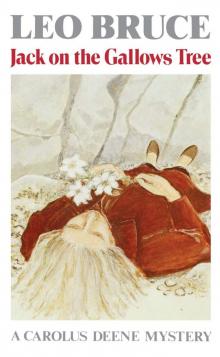 Jack on the Gallows Tree
Jack on the Gallows Tree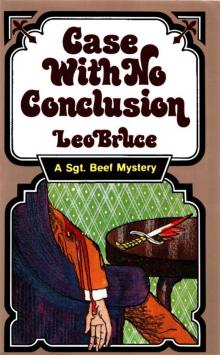 Case with No Conclusion
Case with No Conclusion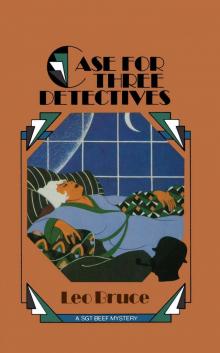 Case for Three Detectives
Case for Three Detectives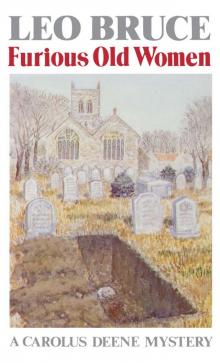 Furious Old Women
Furious Old Women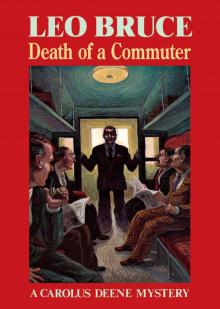 Death of a Commuter
Death of a Commuter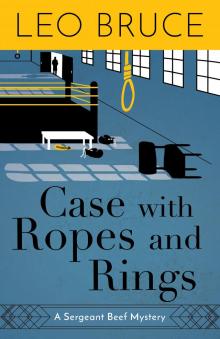 Case with Ropes and Rings
Case with Ropes and Rings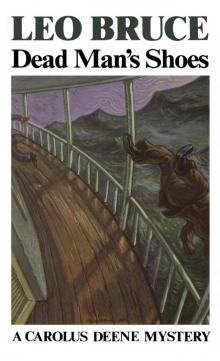 Dead Man’s Shoes
Dead Man’s Shoes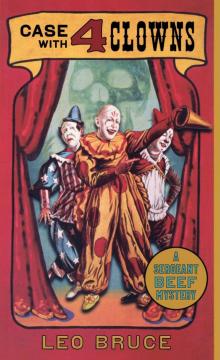 Case with 4 Clowns
Case with 4 Clowns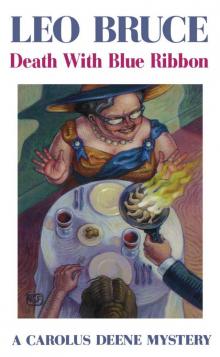 Death with Blue Ribbon
Death with Blue Ribbon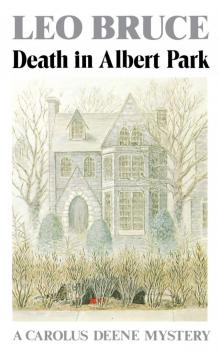 Death in Albert Park
Death in Albert Park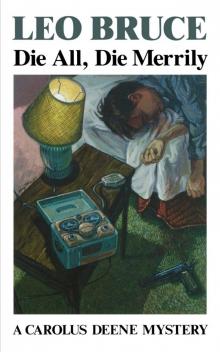 Die All, Die Merrily
Die All, Die Merrily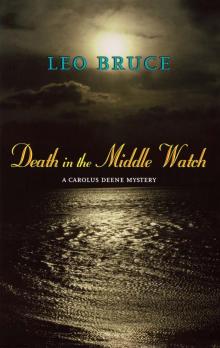 Death in the Middle Watch
Death in the Middle Watch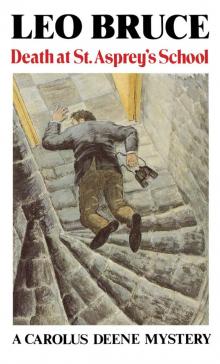 Death at St. Asprey’s School
Death at St. Asprey’s School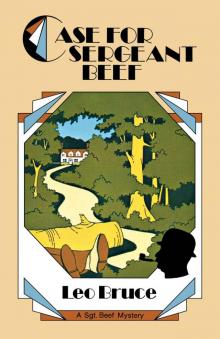 Case for Sergeant Beef
Case for Sergeant Beef